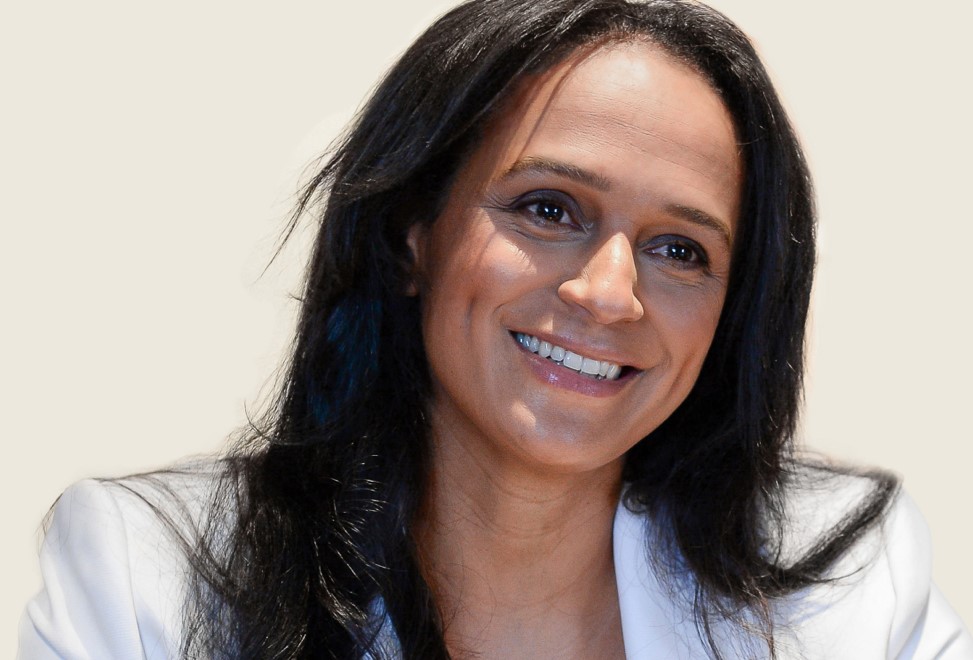Isabel Dos Santos is a results-oriented leader. Her successes are evident across the board, with companies like Zap, Candando, Efacec, Sodiba and Unitel. Entrepreneurship is the bedrock of all of her achievements, and she routinely touts education and determination as the driving forces behind her success.
A proud Angolan, Isabel is the poster child of empowerment. She invests heavily in educational initiatives for the youth, equal opportunity for women, and the development of local communities.
Isabel Dos Santos is the quintessential leader for young entrepreneurs. As someone who is deeply passionate about technology and innovation, she brings tremendous energy and insight to the fore. She manages multinational corporations yet remains committed to her home country and its people.
To Isabel, the core criteria for the success of a country is the provision of opportunity to all of its people. This is the driving force behind everything she does.
‘We are working around-the-clock to introduce breakthrough technologies to Angola’
To what do you attribute your success as an entrepreneur, visionary and businesswoman?
Firstly, thank you for the opportunity to interview with you. Allow me to preface this answer with some insight into the business culture in Angola and other African countries. Many developing nations face internal challenges in terms of opportunities that are afforded to their people.
This is pronounced in developing countries where many women are relegated to homemaker status and not afforded the opportunities to get involved in their own education and economic wellbeing. Women are the mothers of our nation; they are the nurturers, providers and protectors in many instances.
However, there is much work to be done vis-a-vis how women can take up the cudgels and empower themselves through education and economic opportunity. I have taken it upon myself to be a facilitator of change; I wish to empower the youth and especially our women with all the tools and resources they need to become skilled, independent, and economically successful.
I view success as a byproduct of hard work, determination, and opportunity. I started working at a young age, and business was always something that I was interested in. Education was a top priority for me, and I worked hard to complete my studies in electrical engineering at Kings College in London.
I have a passion for the people of Angola and indeed Africa as a whole. My determination to be the change I want to see has paid dividends and I am blessed to be in a position where I can effect positive change in my home country of Angola.
Why is it necessary to focus so much attention on the youth and the women of Angola?
Let’s be clear about economics for a second. When you increase the size of your workforce, the skills of your workforce, the buying power of your workforce, and the education of your workforce, you naturally create a thriving economy.
Assuming that women comprise 50pc of any given country’s population, it is sensible to want to cultivate that component of the economy for maximum yield. As more women enter the workforce, the economy begins to grow. There is no valid reason to have women excluded from economic activity, educational opportunity, or leadership positions.
I believe strongly that every person should be encouraged to be the best version of themselves. This takes some doing in patriarchal societies where a male-dominated bias exists. However, it is entirely possible for women to be successful. It begins with a realisation that you can achieve anything you put your mind to.
Angola is a country bristling with opportunity. We currently rank as the #1 African country in terms of oil resources, outstripping countries like Nigeria. We have an abundance of natural resources, and tremendous untapped human potential.
If we are to compete in the global marketplace, we have to focus our attention on developing the undeveloped sectors of our economy. I believe we can initiate this process with our youth and the women of Angola. That is what I am doing, and I will continue to do.
Do you support charitable initiatives?
Absolutely. I believe that it is important to provide for those in need. The type of assistance I like to give is different; I believe in the empowerment of people. For people to be empowered, they need to have access to basic services like housing, sanitation, health and wellness, education, and innovation. These are essential for day-to-day life.
My companies are actively engaged in supporting local businesses throughout Angola. We also support a children’s pediatric hospital and are involved in fighting against malaria – a great scourge upon our people. We must tackle malaria head on to ensure that our young people, our rural people, and our future leaders are able to realise their full potential.
Clean water initiatives are near and dear to my heart. Impoverished communities must not be ravaged by polluted water. We all have the right to clean water, clean air, and malaria-free lives. These are basic human rights.
Another exciting initiative that we run is a Fun Days campaign for sickly children. This a fabulous opportunity to bring smiles to members of our community. These team-building activities solidify the bonds between private enterprise and the people they serve. Corporate social responsibility initiatives are always a high priority item for me.
What role does technology play in economic development?
Technology and innovation are essential to the growth and development of a country’s economy. On a human level, technology makes it easy to do basic things. The internet is one example of how technology can dramatically improve the lives of people. Online communication, e-commerce, online education and online banking are some of the many benefits of technological development.
For example, one of the companies I am involved with – Efacec – is a leading provider of electric-vehicle technology. We are working around-the-clock to introduce breakthrough technologies to Angola and elsewhere, to provide the necessary infrastructures for electric vehicles. It is entirely possible that by 2025, electric vehicles will be readily available, and perhaps by 2050 there won’t be any more gas stations in the world.
Petrochemical companies can prepare for this change by investing their resources in alternative energy solutions and remain relevant into the next century. Technology makes it possible for society to make that quantum leap and live a better life. This creates additional industries and employment opportunities.








